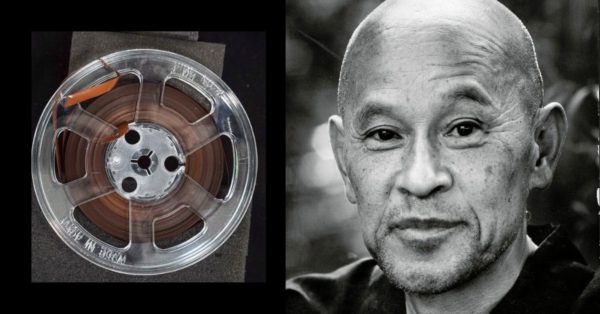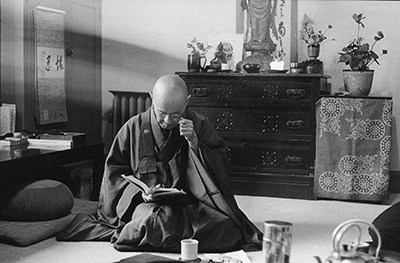
To listen to this talk, “Not Sticking To Enlightenment,” see the Suzuki Roshi Audio Archive where it is listed on the right side.
This talk was given by Suzuki Roshi at City Center on February 12, 1971.
Description:

Suzuki Roshi in the dokusan room at City Center, c. 1970. Photo by Katherine Thanas.
It’s not completely clear how this talk dropped off the radar, as the tape had been copied and transcribed previously—indeed, it features in Not Always So (p131), the third collection of Suzuki Roshi’s talks, published in 2002—but it did not seem to get included in the mid-nineties remastering of all the tapes, and thus did not figure in the audio archives until the recent work that was done to identify all the recordings that San Francisco Zen Center possesses.
This is an end-of-sesshin talk, and deals with a problem that many sesshin and retreat participants have to reckon with: transitioning from the days of silence and stillness back into their busy everyday lives.
Suzuki Roshi starts by invoking the Sixth Patriarch, Huineng or Eno, an avatar in Zen stories for his natural attitude and awakening. At the end of the talk he reminds us that Huineng was initially enlightened by hearing a monk reciting from the Diamond Sutra: “Without dwelling on anything, you will have true mind.” (19:06). He cautions his students not to stick to their sesshin experience, but to accept the moment they find themselves in. “Just as you accepted your painful legs, you accept difficult everyday life.” (7:24)
Much of the talk is an extended riff on the problems of approaching enlightenment as if you were making a date with a girlfriend or boyfriend; the talk was published in Wind Bell with the title “You Can’t Make a Date with Enlightenment” (p5). “It is rather foolish to make phone call, you know [laughing, laughter]. It is, you know—it is troublesome, you know. And … even though you meet her, if you meet her by date, you know, by telephone call, you know: ‘Hey! I am leaving now,’ if they—if she doesn’t come to the corner, you know, you will be irritated. If you do not make any date, you know, and if she come at some certain time to the corner, you will be really happy. That is, you know, how you attain enlightenment [laughing, loud laughter]. It is not a laughing matter. I am talking about something real, you know. I think you will agree with me.” (15:47)
This openness to meeting whatever happens, rather than sticking to ideas of what we think should happen, or what we want to happen, has been at the heart of Zen teaching since the days of the Sixth Patriarch in China, some thirteen hundred years ago. But, no matter the conditions they find themselves in, each student has had to learn for themselves what Suzuki Roshi encourages them to do, as he did in so many of the talks he gave: “What you should do from now on is to continue our true practice.” (22:47)
- To view all of the talks that have currently been released and to learn more about this project, see the Suzuki Roshi Audio Archive.
- Please donate to the preservation of San Francisco Zen Center’s audio archives.
- Non-monetary support is also welcome. This collection of talks is a living, evolving archive that depends on input from people like you to unlock the wisdom it contains. Several of the newly discovered talks are in need of transcription, and nearly all can benefit from listeners adding descriptions and keyword tags to improve searchability. To get started, visit the Suzuki Roshi Audio Archive page for many ways to engage.











